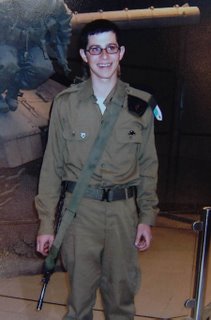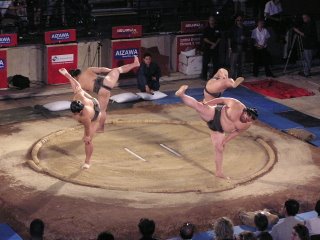ויפנו ויעלו דרך הבשן, ויצא עוג מלך-הבשן לקראתם הוא וכל-עמו, למלחמה אדרעי. ויאמר יהוה אל-משה, אל-תירא אתו, כי בידך נתתי אתו ואת-כל-עמו, ואת-ארצו; ועשית לו כאשר עשית לסיחן מלך האמרי, אשר יושב בחשבון
(במדבר כ"א, ל"ג-ל"ד)
At the end of parashat Chukat the conquest of the Promised Land begins. Finally, after almost 40 years of wanderings in the desert, the people of Israel under the leadership of Moshe begin fulfilling the divine promise by conquering the eastern part of Eretz Israel (what is today Jordan).
After defeating Sichon, king of the Emorites, the people of Israel are faced with a new threat: Og, king of Bashan, deploys his army and ventures out to meet this nomadic people that dared challenge his land. And this is how the Torah tells it:
And they turned and went up by the way of Bashan; and Og the king of Bashan went out against them, he and all his people, to battle at Edrei. And God said unto Moses: "Fear him not; for I have delivered him into thy hand, and all his people, and his land; and thou shalt do to him as thou didst unto Sihon king of the Amorites, who dwelt at Heshbon."
(BaMidbar, 21, 34-35)
How surprising. Moshe, who is well awaer of God's promise to give the land to the people of Israel and who has just defeated an enemy no less powerful than Og, is so afraid of the upcoming battle that God needs to reassure him that all will be well? We would have expected the people, perhaps following in the footsteps of the ten spies, to fear the army of Og, but Moshe? What is it in Og specifically that scares Moshe so?
The Midrash tells us that Og, the giant, had special merits. He survived the flood (by hanging onto Noah's ark), but more importantly, he is the palit (refugee) that alerted Avraham and told him about the capture of Lot in Soddom. This brute king is not just another enemy. Moshe, knowing his history, is afraid that Og's good deeds in the past will work in his favour and is therefore afraid of losing this battle. Hence the reassurances from God's side.
The same Midrash continues and tells us of how the actual "battle" was fought. Og picked up a mountain the size of the encampment of Israel, and threatened Moshe with it. Moshe and Israel prayed to God and small bugs ate up the mountain from the inside, causing it to crumble on top of Og, thus trapping the giant. Moshe then fell the giant with a one precise hit aimed at his ankle (I guess this the Jewish version of Achille's Heel...).
If we look at this story not literally but symbolically, Og was beaten not by military force but by spiritual force. It was by the prayer of Israel that Og's might (the mountain) was destroyed from within. Moshe had to deal with whatever merits Og had by fighting back with superior merits, the force of true prayer. The lesson learnt here is that the war fought against the inhabitants of the Land of Israel cannot be won by sheer force. However strong Israel's army might be, if it does not attain and maintain higher moral and spiritual standards compared with the enemy, it will not win. Once these higher standards are reached, then, and only then, can the use of force be successful. In the words of the prophet: "Not by might, nor by power, but by My spirit, said the Lord of hosts" (Zechariah, 4, 6).
May this lesson of Moshe's fight against Og be a lesson for our generation as well.











